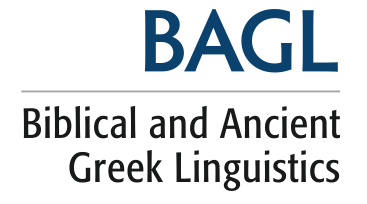9.1 | Stanley E. Porter McMaster Divinity College, Hamilton, ON, Canada Academic and intellectual communities are known for various areas of subject
expertise. When one thinks of Greek grammar, including that of the New Testament,
one thinks of Germany, and possibly Great Britain, but rarely Canada. An examination
of recent trends regarding the study of ancient languages, especially Greek, in
various institutions within Canada serves in this paper as an analogy for the study
of other, related subjects, indicating some possible reasons why our field of
biblical studies is increasingly an embattled subject and what we can do to address
some of the issues involved. Keywords: Greek, grammar, linguistics, traditional grammar, modern linguistics,
rationalism, comparative historicism |
9.2 | Paul L. Danove Villanova University, Villanova, PA, USA This article investigates the licensing properties of the cognate nouns of
verbs that grammaticalize communication in the New Testament. The preliminary
discussion reviews the semantic, syntactic, and lexical requirements of the fifty
verbs of communication that have cognate nouns in the New Testament and develops
general characteristics of the verbs’ sixty-four cognate nouns. The investigation of
the cognate nouns describes their licensing properties, resolves their occurrences
into six distinct usages, specifies all observed lexical realizations of required
complements, and identifies the conditions for polysemy. Keywords: cognate, communication, grammaticalization, noun, verb |
9.3 | Kyriakoula Papademetriou Aristotle University of Thessaloniki, Thessaloniki, Greece The use of ἵνα in Hellenistic Koine and in the New Testament texts has been
sufficiently investigated and its linguistic development from Classical Greek to
Modern Greek has been outlined. This paper intends to contribute to this discussion,
drawing attention to the syntax of the substantive clauses in Latin introduced with
the conjunction ut, and suggesting a similar syntax of ἵνα employed as a novel
volitional expression in Hellenistic Koine. Concretely, while the prevailing view is
that there is an independent parallel development, the present paper aims to
reinforce the view that there is a Latin influence in this particular case. The
sociolinguistic factors of bilingualism and language interference are highlighted,
and for the first time, as far as we know, the Latin translation practice practiced
widely in the Roman Empire is suggested as an argument to support this
view. Keywords: Hellenistic Koine, ἵνα, final infinitive, volitional clauses, volitional ἵνα
clauses, Latin influence, sociolinguistics |
9.4 | Brett Miller Though several scholars have argued that συμμαρτυρέω was readily used without
the associative sense ‘testify with or jointly’ prominent in standard lexica, a
fresh examination of a wide range of texts discloses an even stronger than expected
correlation between the use of συμμαρτυρέω and the occurrence of concordant
affirmations in its context. This supports the argument that the verb’s meaning is
normally associative after all. Aspects of its extra-biblical use also help to
resolve theological objections that have been lodged against it being ascribed an
associative sense in the New Testament. Keywords: semantics, testimony, witness, corroboration, Paul, Romans |

